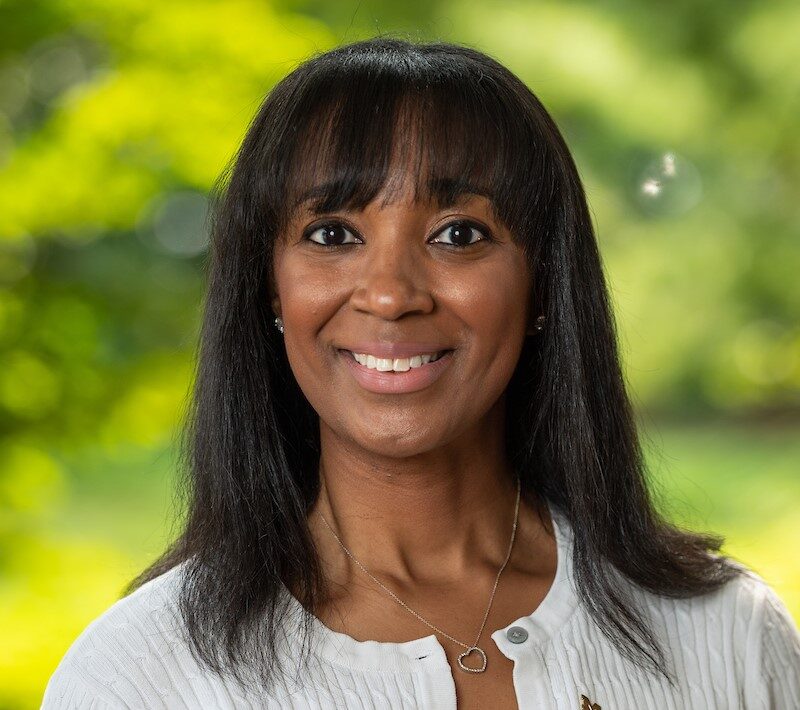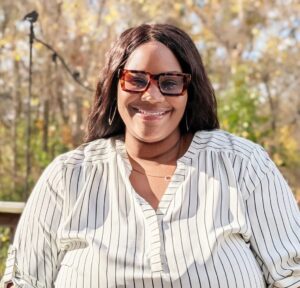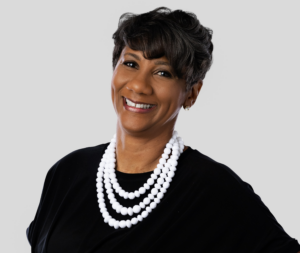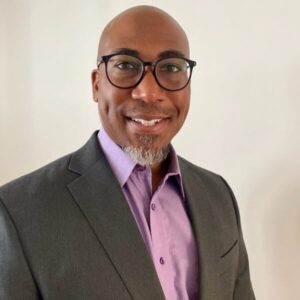University of Michigan’s Communications Director Lauren Love on authentic storytelling
Lauren Love shares how Beyoncé and some of her favorite books have inspired her career.

Lauren Love has dedicated over 15 years to shaping narratives in the nonprofit and higher education arenas. As the Communications Director for the Office of the Vice President for Government Relations at the University of Michigan, Love works to illustrate the vital role of higher education, research, and innovation to a diverse audience, including government officials, alumni, and internal stakeholders.
Before stepping into this role, the communications director served as a senior media relations and public affairs representative at U-M, managing high-stakes institutional news and crisis communication. Her background also includes roles at the University of Notre Dame Law School, the Chicago Urban League, and the Rainbow PUSH Coalition, where she served as press secretary for Rev. Jesse L. Jackson, Sr.
A strong advocate for authentic communication, Love believes that narratives grounded in honesty resonate more deeply with audiences, who are quick to identify disingenuous messaging. “The key to excellence in storytelling is authenticity,” she told Ragan.
My first comms job was:
My first role in communications was with a boutique PR firm founded by a former African American journalist from Chicago. Working at a smaller firm gave me the unique opportunity to gain hands-on experience with a diverse range of clients early in my career.
I was able to dive into all aspects of the business, from media relations to event planning, and even crisis communications. Being part of a smaller team meant that I had the chance to work directly with some truly dynamic clients, which was both challenging and rewarding. This experience laid a strong foundation for my career, teaching me the importance of adaptability, resourcefulness, and the value of building authentic relationships.
The thing I’m most excited about for the future of my profession is:
The potential to blend technology with storytelling in ways we haven’t seen before. With advancements in AI, data analytics, and digital platforms, we have more tools at our disposal to reach audiences in meaningful, personalized ways.
But what really excites me is how these tools can enhance—not replace—the human element in PR. For example, AI can handle data analysis and trend forecasting, allowing us to make more informed decisions and connect with people on a deeper level. We’re also able to measure our impact more accurately, which helps us align more closely with business objectives and demonstrate our value to leadership.
At the same time, I think there’s a growing emphasis on authenticity and transparency, especially as consumers become more discerning. As PR professionals, we’re in a unique position to bridge that gap between organizations and their audiences by crafting narratives that resonate on a human level. I believe the future of PR will be about combining high-tech tools with timeless storytelling skills to create trust and build lasting relationships. It’s an exciting time to be in this field!
One thing that worries me about the future of my profession is:
The increasing polarization and the way influencer culture has shifted perceptions of expertise. We’re living in a time when anyone can claim to be an expert, often without the experience or knowledge to back it up. This creates a challenge for communications professionals who are committed to accuracy and integrity, especially in a landscape where misinformation can spread rapidly and deeply influence public opinion.
The polarization we’re seeing also means that audiences are more likely to seek out information that reinforces their existing beliefs, rather than engaging with a diverse range of perspectives. This makes our work harder, as we strive to create messages that can break through echo chambers and resonate across different viewpoints.
We have a responsibility to elevate informed voices and promote fact-based narratives. I think our role will become increasingly important in helping people distinguish credible information from noise. It’s both a challenge and an opportunity to reinforce the value of true expertise and foster a more informed, engaged public. Despite these concerns, I’m hopeful that we can adapt and continue to make a positive impact by standing firm in our commitment to ethical communication and promoting authentic, meaningful dialogue.
A book or song that changed the way I think about my career is:
Three books that have profoundly shaped the way I think about my career are Fabulosity: What It Is & How to Get It by Kimora Lee Simmons, More than Enough by Elaine Welteroth, and Year of Yes: How to Dance It Out, Stand in the Sun and Be Your Own Person by Shonda Rhimes.
Each of these books has offered me unique insights and inspiration. Fabulosity taught me about embracing my own confidence and celebrating my individuality—it’s a reminder that success comes from being true to yourself and standing proudly in your own power. More than Enough resonated with me deeply, as Elaine Welteroth’s story of breaking barriers and pushing for representation in media reinforced the importance of owning your worth and believing that you are more than enough in any room you walk into.
Finally, Year of Yes by Shonda Rhimes inspired me to step out of my comfort zone. Rhimes’ commitment to saying yes to new opportunities reminded me of the power of embracing challenges and pushing past fear. Together, these books have encouraged me to be bold, authentic, and unapologetically ambitious in my career.
I’ll add that Beyonce continues to provide the soundtrack of my life. Her Renaissance album continues to get regular rotation while I get dressed for work or make my short commute.
Someone who has helped me be successful in my career is:
Two people who have been instrumental in my success are two of my former managers: Rick Fitzgerald and Roderick Hawkins. Rick, who retired as vice president for public affairs at the University of Michigan, was an extraordinary leader. He had a unique talent for engaging every team member on a project and made sure that everyone felt their contributions—big or small—were integral to the project’s success. He led with unwavering integrity and empathy, and he taught me that you don’t need to be unkind to be an effective leader. Rick truly believed that senior leaders don’t have to be intimidating to inspire respect and dedication.
Roderick Hawkins, who is now the associate dean of external affairs and chief of staff at Northwestern University’s school of communication, has also been a tremendous influence. Roderick brings vibrant energy and a genuine passion for building relationships across sectors. He continues to demonstrate how powerful it is to connect with people from all walks of life, and his ability to foster partnerships and collaborations has been a great source of inspiration for me. Both Rick and Roderick have shaped my career by modeling the kind of leadership that combines strength with compassion, and I am grateful for their guidance and support.
One piece of advice I would give other people in my profession is:
One piece of advice I would give to others in my profession is to never underestimate the power of relationships. In PR and communications, our work is all about connecting with people—whether it’s building trust with stakeholders, cultivating media contacts, or engaging with your audience. Take the time to genuinely understand and listen to others, and prioritize relationship-building as much as you would any other strategic goal.
By investing in meaningful relationships, you not only create a strong network but also position yourself as a trusted resource. These connections often open doors to new opportunities, amplify your messages, and help you navigate challenges more effectively. Remember, at the heart of every great PR campaign is a foundation of trust, respect, and genuine connection.
The key to excellence in storytelling is:
The key to excellence in storytelling is authenticity. True storytelling resonates when it’s grounded in honesty and reflects the genuine values, mission, and voice of the organization. Audiences today are incredibly savvy, and they can sense when a story is disingenuous or overly polished.
Excellence in storytelling requires a deep understanding of both the audience and the organization. It’s about knowing what makes people care and connecting on an emotional level. This means digging deeper to find those real, human moments that capture attention and inspire trust. A good story doesn’t just promote a product or idea—it creates a connection, fosters empathy, and ultimately builds lasting relationships.
In my experience, authenticity in storytelling not only enhances credibility but also helps communicate the essence of a brand or organization in a way that resonates. By staying true to the core message and delivering it with empathy and integrity, we can tell stories that not only inform but also leave a lasting impact.
Isis Simpson-Mersha is a conference producer/ reporter for Ragan. Follow her on LinkedIn.







